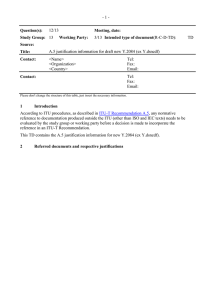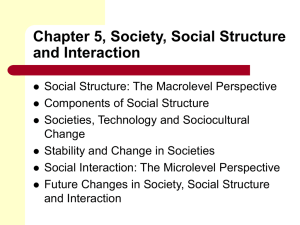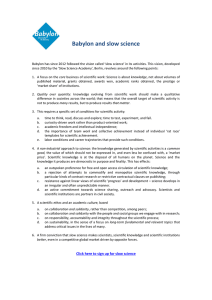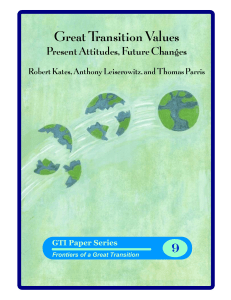Future Trends Series - GR:EEN Project
advertisement
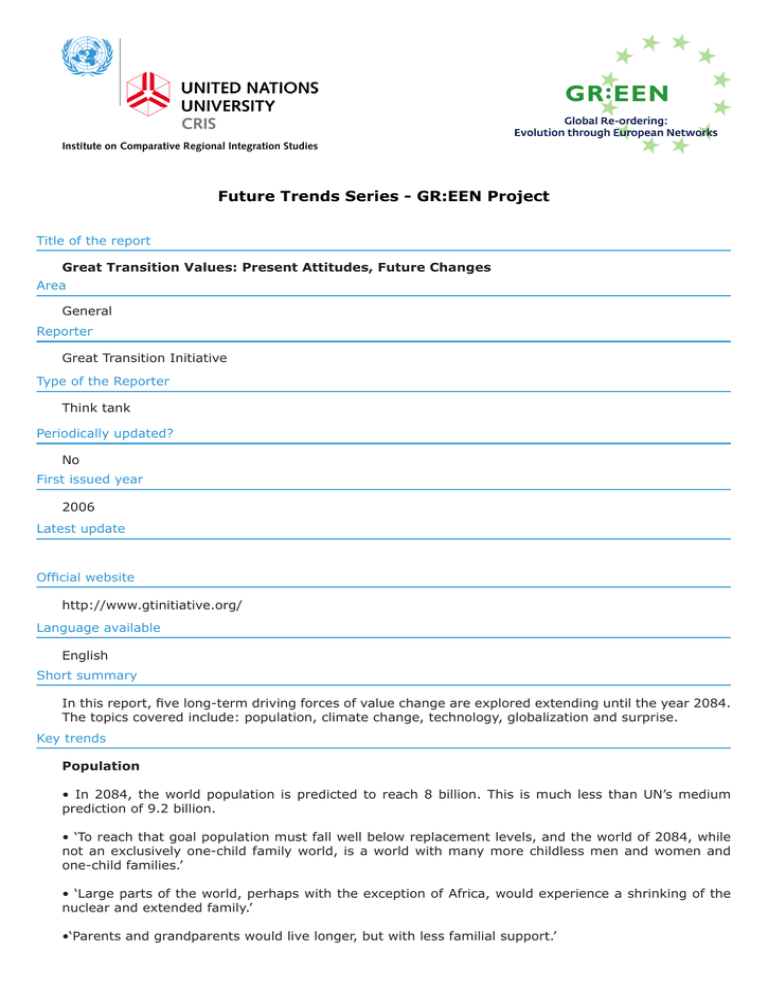
Future Trends Series - GR:EEN Project Title of the report Great Transition Values: Present Attitudes, Future Changes Area General Reporter Great Transition Initiative Type of the Reporter Think tank Periodically updated? No First issued year 2006 Latest update Official website http://www.gtinitiative.org/ Language available English Short summary In this report, five long-term driving forces of value change are explored extending until the year 2084. The topics covered include: population, climate change, technology, globalization and surprise. Key trends Population • In 2084, the world population is predicted to reach 8 billion. This is much less than UN’s medium prediction of 9.2 billion. • ‘To reach that goal population must fall well below replacement levels, and the world of 2084, while not an exclusively one-child family world, is a world with many more childless men and women and one-child families.’ • ‘Large parts of the world, perhaps with the exception of Africa, would experience a shrinking of the nuclear and extended family.’ •‘Parents and grandparents would live longer, but with less familial support.’ •Currently, familial solidarity is the most important expression of solidarity, especially across generations. But with smaller families, it is possible that more time and resources will be available for the extension of solidarity to others in local communities as well as to those distant in time and space. On the other hand, smaller families might also encourage further individualism and self-seeking behavior. Climate • ‘By 2084, humankind will probably be in the midst of the most profound change in its environment since its emergence. The world of climate change—warmer in most places, wetter and dryer in others— will be evident everywhere.’ • ‘Ecological sensibility could be enhanced by the global effort to limit greenhouse gas emissions and solidarity could be encouraged as the places, peoples, and species particularly vulnerable to adverse impacts became well known.’ • ‘Climate change will surely increase global inequity. Vulnerability to climate change will be greatest overall in developing countries, with their lesser capacity to adapt to such change. Ecological sensibility could also diminish. Familiar ecosystems will undergo major change and large-scale adaptation by both people and species will occur.’ • ‘Many simultaneous adverse impacts affecting people and places both immediate and distant could decrease solidarity as communities struggle to adapt to local conditions and compete with one another for suitable places to live. The disparate behavior of some industrialized developing countries in reducing their consumption of fossil fuel energy can diminish solidarity both in the North and the South.’ Technology • ‘By 2084 major sources of oil will probably have been exhausted and the remaining supplies will be priced to allow only the most essential uses. The burning of natural gas and coal will also be limited by the need to restrict global warming to 2°C, unless low-cost carbon sequestration becomes a reality’. • ‘By 2084, the end of fossil fuels will have triggered a new industrial and technological revolution in alternative sources of energy. As with technology today, however, these new technologies will strengthen some values and conflict with others. The decentralization of energy production may enable lifestyle alternatives not dependent on high-consumption modes and facilitate development.’ • ‘Developing countries of the South may use these energy and emissions needs to leapfrog to more advanced technologies, including major sources of hydrogen converted to fuel through solar power. Yet the current greater faith in technology in developing countries may also lead to real conflicts over the meaning of ecological sensibility, as is the case with biotechnology and genetically modified plants.’ Globalization • ‘By 2084, world geography may be very different than today—more connected, more urban, yet more natural, more regional, and more virtual. Globalization, with its broadening, deepening, and speeding up of global connectedness will tie places and peoples together long separated by the tyranny of distance.’ • ‘By 2084, most of the world’s population will be living in cities compared to the barely half today.’ • ‘In 2084, a virtual world with wireless Internet, phone, and television may be almost universally available and increasingly used to substitute for more limited air travel.’ Surprise • ‘Looking to the future, the speed, timing, and specific nature of events, technologies, and social movements will continue to surprise us, thus we should not be surprised if the values to which we aspire are either accelerated or are in retreat many times into the future.’ Suggestions / Methodology Research from primary sources and modelling Reference to other trends reports? If yes, which reports? /
